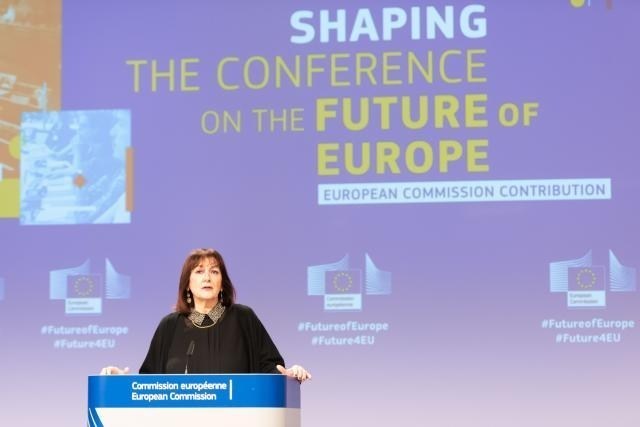The presidents of the three main European institutions, the Parliament, the Council and the Commission, adopted last week a joint declaration on the Conference of the Future of Europe. The conference is expected to get started on Europe day, 9 May, marking the anniversary of the Schumann declaration.
The Conference had been hanging in the air because of the coronavirus crisis but the Portuguese Presidency did its utmost to achieve an agreement between the institutions on the governance structure of the conference.
The three institutions will act as Joint Chairmanship on the basis of equal representation and decision by consensus. Under their Chairmanship, an Executive Committee and Common Secretariat will take care of the day-to-day management.
The Conference of Presidents of the European Parliament commented, however, that “As direct representatives of European citizens, as stated in the EU Treaty, the European Parliament will hold a leading role in the Conference.”
“As group leaders representing the broad diversity of EU citizens, we trust that the European Parliament’s prominent role will be reflected in the work and in the practical organisation of the Conference itself.”
The Portuguese Prime Minister António Costa, who signed the joint declaration on behalf of the European Council, said in January that the Conference should become an opportunity for a discussion involving institutions and citizens on the directions and results of European policies.
"The Conference should focus on the concerns and wishes of citizens and not on institutional issues. The Conference must be oriented towards policies and common responses to the strategic challenges that we have to face in an increasingly less Eurocentric world.”
In the declaration, the European institutions are committing themselves to engage with citizens for democracy and building a more resilient Europe. The Conference is described as a citizen focused and bottom-up exercise for Europeans to have their way on what they expect from the EU.
The conference events, in the form of physical gatherings or in digital settings, can be organised at different levels, including European, national, transnational and regional level, and will involve civil society and stakeholders. “Citizens’ participations in the events should aim at mirroring Europe’s diversity.”
At the European level, the organisers commit to organise European citizens’ panels. Input from all conference events will be collected, analysed and published via a multilingual digital platform. A feedback mechanism will ensure that the ideas expressed during the conference events will result in concrete recommendations for EU action.
The declaration lists a number of topical issues to be discussed, such as the fight against climate change, the economy, social fairness, equality, European rights and values, rule of law, migration challenges, EU’s role in the world, and the strengthening of democratic processes governing the EU. Furthermore, “Citizens remain free to raise additional issues that matter to them.”
There will probably be 27 national representative panels, that will pointing out opportunities to find solutions within the decided themes. At the European panels, citizens with the support of independent experts may develop their own policy proposals for each theme.
On-line voting
It is also possible that citizens will be able to vote via the online platform on which policy proposals are best and most important. The main policy proposals will be presented to a plenary meeting a few times during the year. The plenum will consist of MEPs, Commissioners, government representatives as decision-makers and a number of other organizations in an advisory capacity.
The plenary conclusions can also be put to the vote online and will then be considered by the three European institutions, like any other policy proposals.
Europe’s People´s Forum, representing more than 27 technical partners and 60 civil society organisations all over Europe, welcomed the Joint Declaration by the three European institutions. “We note with pleasure that many of our recommendations to the three institutions have been reflected in the overall methodology,” commented Roger Casale, its acting president.
“Particularly we are pleased that the quality of the policy proposals developed by the citizens through careful deliberation in the European thematic agora will have a possibility to build on also national level deliberations and online inputs.”
“The time for the Conference is limited to one year,” he added. “This makes it very important that the agenda for the Conference can be decided very quickly through citizens’ online priorities. “It also makes it important to compensate the limited time by closely linking the deliberative processes in the national panels with the processes in the European thematic agora deliberations.”
M.Apelblat
The Brussels Times

